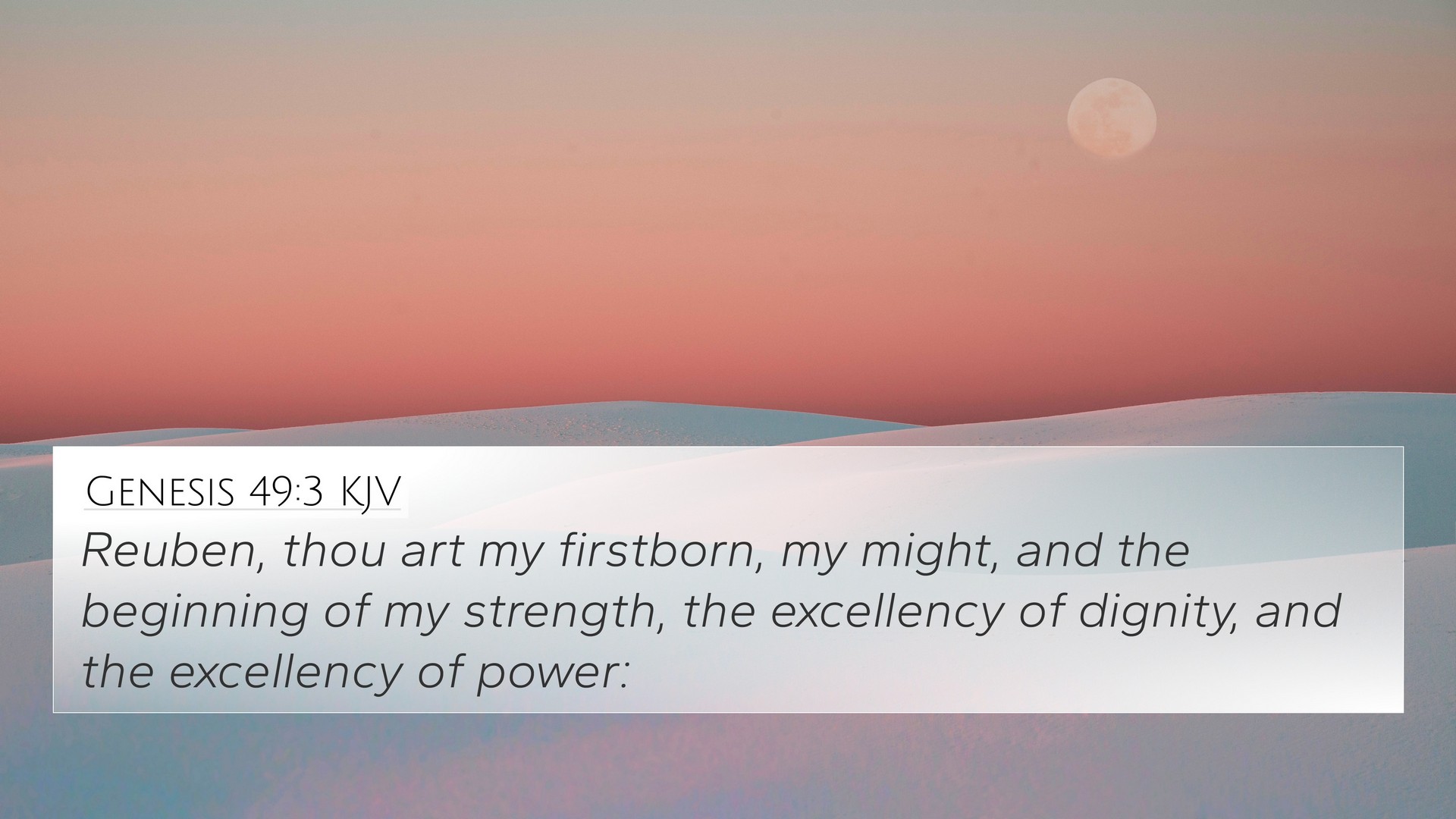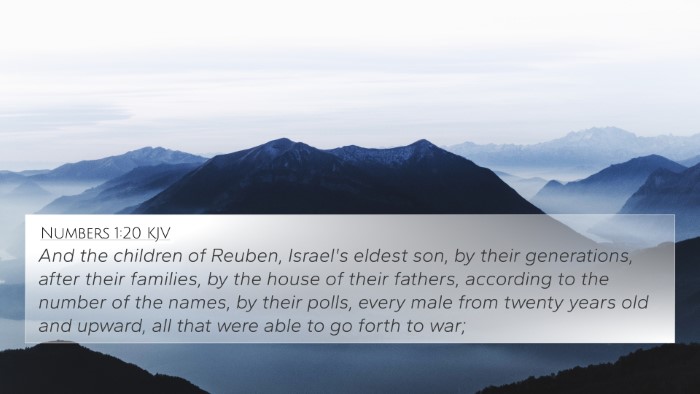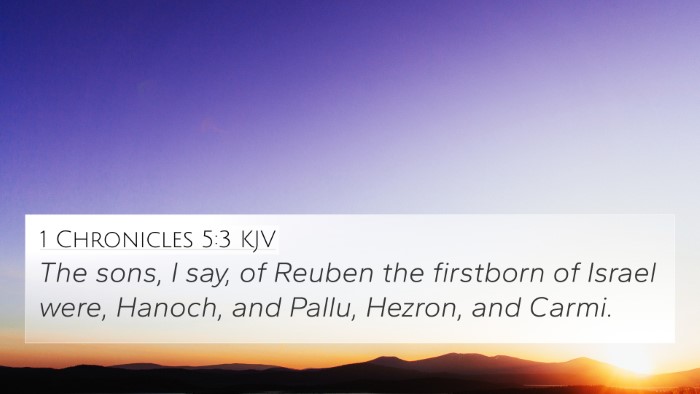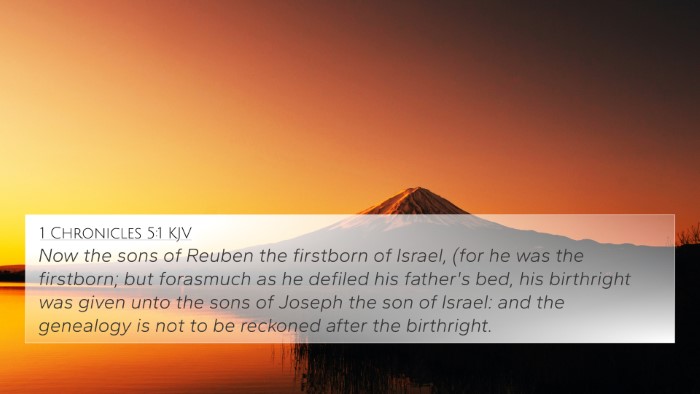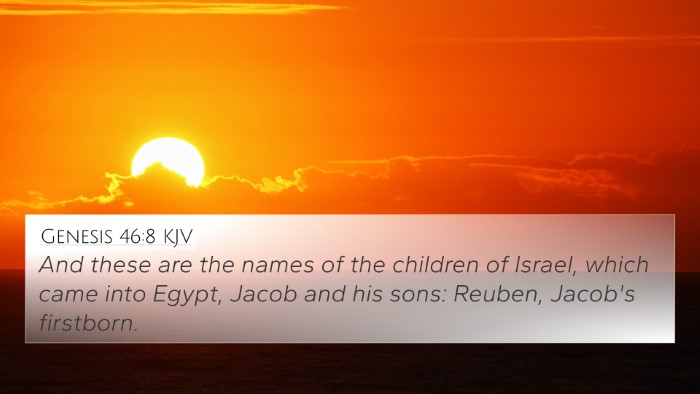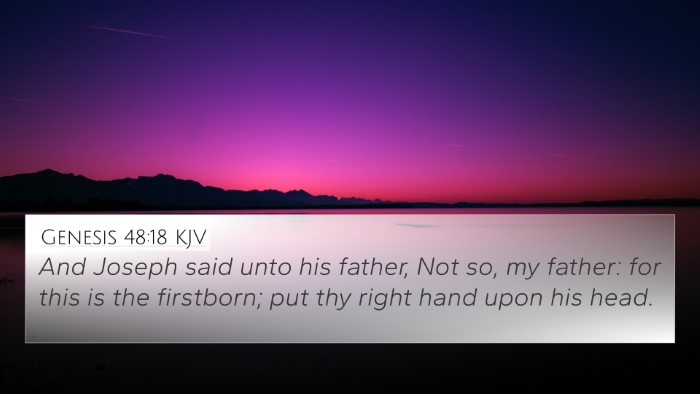Understanding Genesis 49:3
Genesis 49:3 reads:
"Reuben, thou art my firstborn, my might, and the beginning of my strength, the excellency of dignity, and the excellency of power."
This verse is part of Jacob's blessings to his sons, where he addresses each of them individually, beginning with Reuben, his firstborn. This commentary aims to delve into the meaning of this verse, combining insights from prominent public domain sources such as Matthew Henry, Albert Barnes, and Adam Clarke.
Exegesis and Context
In Genesis 49:1-28, Jacob gathers his sons to pronounce prophetic blessings over each one. This final act before his death carries significant weight, as it reflects the character and future of each son and their descendants. Here are some key insights:
- Significance of Birth Order: Reuben, being Jacob's firstborn, holds a place of honor and is recognized as the beginning of Jacob's strength (Henry). However, it's crucial to note how this honor contrasts with Reuben's actions, which ultimately cost him his birthright.
- Power and Dignity: The phrase "the excellency of dignity, and the excellency of power" highlights Reuben's inherent potential to lead and his father's expectations of him (Barnes). However, this potential is complicated by Reuben's failures.
- Spiritual and Temporal Implications: Reuben's position represents both spiritual significance and temporal power, as he was expected to guide his family spiritually and politically. Adam Clarke emphasizes that this blessing recognizes inherent qualities while foreshadowing future failures.
Comparative Bible Verse Analysis
This verse can be cross-referenced with several prominent biblical texts that shed light on Reuben’s character and legacy:
- 1 Chronicles 5:1-2: "Now the sons of Reuben the firstborn of Israel, he was the firstborn; but forasmuch as he defiled his father's bed, his birthright was given unto the sons of Joseph." This illustrates the tragic loss of Reuben's birthright due to sin.
- Genesis 35:22: This verse narrates the tragedy of Reuben sleeping with Bilhah, his father’s concubine, marking a pivotal moment that disqualified him from leadership.
- Hebrews 12:16-17: This New Testament passage warns against moral failure, drawing parallels to Esau's loss of his birthright, resonating with the theme of Reuben's misplaced integrity.
- Deuteronomy 33:6: Moses' blessing of Reuben reflects on his fate, "Let Reuben live, and not die; and let not his men be few," signifying his significance despite past failures.
- Genesis 41:51-52: Joseph names his sons reflecting family struggles; symbolic connections can be drawn towards Reuben's legacy and the division within the family.
- Genesis 29:32: Reuben's name means "See, a son!" signifying Jacob's joy in his firstborn, which deepens the poignancy of his later failures.
- Numbers 2:10: This passage discusses Reuben's position in Israel's tribal order, illustrating the active role and responsibilities he carries despite his shortcomings.
Thematic Connections
The themes embedded in Genesis 49:3 extend beyond Reuben to larger motifs present in the Bible:
- Leadership and Responsibility: Genesis reflects a pattern of leadership tied to moral integrity, evident in the narrative of Reuben among other patriarchs.
- Consequences of Sin: Reuben’s fall from grace serves as a warning regarding the severe consequences of stepping outside moral bounds.
- Divine Sovereignty: Despite Reuben's failures, God’s plan persists, suggesting that human actions do not thwart divine purposes.
Tools for Bible Cross-Referencing
For deeper exploration, utilizing cross-referencing resources can enhance one's understanding. These include:
- Bible Concordance: Helps find similar themes and verses across the scripture.
- Bible Cross-Reference Guide: A systematic approach to study connections among verses.
- Bible Cross-Reference System: An organized way to explore inter-Biblical dialogue.
Conclusion
In Genesis 49:3, we witness a powerful conjunction of potential and failure, dignity and disgrace. Reuben's story serves as a reminder of the weight of one’s actions in the context of family legacy and divine purpose. The verse’s significance is not merely historical but serves as a guide for understanding the complexities of leadership and the moral responsibilities that come with it.
As you study this verse, reflect on its cross-references to uncover deeper layers of meaning. Each biblical narrative interconnects, forming a tapestry of divine truth and human experience.
